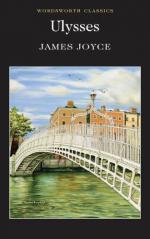physic to take the bull by the horns. Come, come,
says Mr Vincent, plain dealing. He’ll find
himself on the horns of a dilemma if he meddles with
a bull that’s Irish, says he. Irish by name
and irish by nature, says Mr Stephen, and he sent
the ale purling about, an Irish bull in an English
chinashop. I conceive you, says Mr Dixon.
It is that same bull that was sent to our island by
farmer Nicholas, the bravest cattlebreeder of them
all, with an emerald ring in his nose. True for
you, says Mr Vincent cross the table, and a bullseye
into the bargain, says he, and a plumper and a portlier
bull, says he, never shit on shamrock. He had
horns galore, a coat of cloth of gold and a sweet smoky
breath coming out of his nostrils so that the women
of our island, leaving doughballs and rollingpins,
followed after him hanging his bulliness in daisychains.
What for that, says Mr Dixon, but before he came over
farmer Nicholas that was a eunuch had him properly
gelded by a college of doctors who were no better
off than himself. So be off now, says he, and
do all my cousin german the lord Harry tells you and
take a farmer’s blessing, and with that he slapped
his posteriors very soundly. But the slap and
the blessing stood him friend, says Mr Vincent, for
to make up he taught him a trick worth two of the
other so that maid, wife, abbess and widow to this
day affirm that they would rather any time of the month
whisper in his ear in the dark of a cowhouse or get
a lick on the nape from his long holy tongue than
lie with the finest strapping young ravisher in the
four fields of all Ireland. Another then put
in his word: And they dressed him, says he, in
a point shift and petticoat with a tippet and girdle
and ruffles on his wrists and clipped his forelock
and rubbed him all over with spermacetic oil and built
stables for him at every turn of the road with a gold
manger in each full of the best hay in the market so
that he could doss and dung to his heart’s content.
By this time the father of the faithful (for so they
called him) was grown so heavy that he could scarce
walk to pasture. To remedy which our cozening
dames and damsels brought him his fodder in their
apronlaps and as soon as his belly was full he would
rear up on his hind uarters to show their ladyships
a mystery and roar and bellow out of him in bulls’
language and they all after him. Ay, says another,
and so pampered was he that he would suffer nought
to grow in all the land but green grass for himself
(for that was the only colour to his mind) and there
was a board put up on a hillock in the middle of the
island with a printed notice, saying: By the Lord
Harry, Green is the grass that grows on the ground.
And, says Mr Dixon, if ever he got scent of a cattleraider
in Roscommon or the wilds of Connemara or a husbandman
in Sligo that was sowing as much as a handful of mustard
or a bag of rapeseed out he’d run amok over half
the countryside rooting up with his horns whatever
was planted and all by lord Harry’s orders.




